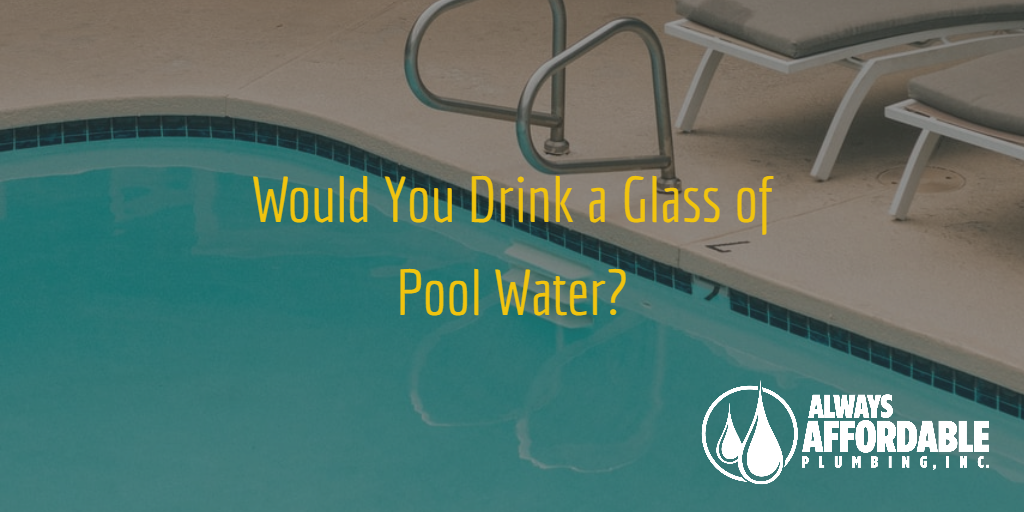
12 Nov Should Your Drinking Water Have More Chlorine than a Pool?
Just How Safe is Your Tap Water?
Best East Bay Plumber | Home Water Filters In America, we have an expectation that the water coming into our homes is safe to drink and use. The U.S. EPA has created standards for the quality of our water, which requires water treatment facilities to filter and sanitize water before it gets to our taps. However, it would be extremely costly and difficult to have perfectly pure water for everyone. As such, the EPA sets “allowable” limits of certain chemicals and contaminants. Meaning, there are some things in our drinking water that the EPA recognizes as unsafe, but allows in our water as long as it is stays at levels that they deem “safe” to consume. This includes things like arsenic, lead, and chlorine. It also includes many contaminants that they don’t even regulate. Our water is generally very safe. Especially compared to the rest of the world. However, that does not mean it is as safe as it can be.
Would You Drink Pool Water?
Most of us would probably not drink a glass of pool water. For starters, we might consider it dirty. Additionally, many of us will say it has high levels of chlorine in it. Pools need chlorine to prevent the growth of algae and bacteria. This is the same for our drinking water treatment centers. While chlorine works great as a disinfectant, most of us recognize that chlorine is harmful for us to ingest.
Here is an interesting fact about chlorine levels: it is recommended that a pool maintain a chlorine level between 1.0ppm-3.0ppm. The EPA allows a DRINKING WATER level of chlorine of UP TO 4.0ppm!
Essentially, that means that the tap water which you drink may have higher levels of chlorine in it than would be recommended for the pool you swim in. Try to wrap your head around that for a moment. And then decide if you are comfortable drinking water with that much chlorine in it.
Here are 5 more chlorine facts you should know when it comes to your drinking water:
- The presence of chlorine in tap water has been linked to the dramatic rise of heart disease in the United States. Scientists argue that chlorine is a primary cause of the development of atherosclerosis, or hardening of the arteries.
- Studies show chlorinated water is toxic to human intestinal bacteria, the body’s natural flora that converts organic compounds in our food into necessary nutrients.
- After large rainstorms, your municipal water center may add more chlorine to the water supply to treat potentially larger number of microorganisms due to runoff or sewage discharges.
- Chlorinated water increases the amount of heavy metals such as lead and copper that are leached from pipes into tap water.
- Because chlorine is a calcium antagonist, long-term consumption of chlorinated water has been linked to loss of calcium in bones. Chlorinated tap water has also been linked to childhood and adult asthma and allergies.
High chlorine levels can also be damaging to your plumbing equipment and pipes. For example, the City of Folsom just released their findings regarding thousands of homes experiencing pinhole leaks in their copper pipes. The results point towards chlorine being a contributing factor. (READ MORE ABOUT IT HERE)
Can Home Water Filters Remove Chlorine from Your Drinking Water?
The good news is, if you are uncomfortable with having chlorine in your water, you can do something about it. An Activated Charcoal filter is considered to be the best filter for this. It is effective at removing chlorine and chlorine by-products. It also removes many other contaminants.
According to the EPA, an Activated Charcoal filter removes:
- all 32 identified organic contaminants including THMs (by-products from chlorine)
- all 14 listed pesticides (this includes nitrates as well as pesticides such as glyphosate also referred to as Roundup)
- the 12 most common herbicides
This is great news! Additionally, it is very affordable. Home water filters range from point-of-use to whole home. A water pitcher filter systems, like a Brita, is a simple and affordable option. There are also under-the-sink systems that are around $100 plus installation. However, it is important to understand that this kind of filter does not filter out everything. It is just one important component of a high quality, multi-stage filter system. The best thing to do is CALL AAP TODAY to have one of our licensed professionals perform a tap water test for you. We can show you the levels of things like chlorine in your water, and explain what home water filters we recommend.
Service, quality, and affordability for our customers always comes first. Call today to schedule your appointment!
For our great plumbing tips and updates, FOLLOW US ON FACEBOOK!
CLICK HERE TO LEARN MORE ABOUT YOUR TAP WATER
Find out more about Always Affordable Plumbing (Lic. #1003782) by calling (916) 970-0188.
Best East Bay Plumber | Water Filter Systems


